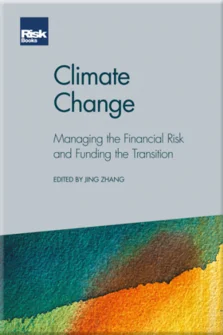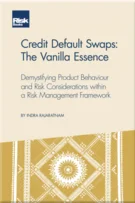Sustainability for critical ecosystems: The future of risk management – more of the same or a new paradigm?
Nick Silitch
Foreword
Introduction
Sustainability for critical ecosystems: The future of risk management – more of the same or a new paradigm?
Climate change is a source of financial risk
The climate disclosure landscape in the finance sector
Green boxes? An overview of climate risk tools and analytics
Embedding climate change in financial metrics
Modelling climate physical risks
Climate-related stress-testing: Transition risks
Catastrophe risk modelling and climate change
Evidence-based climate stress testing
Climate risk drives a new paradigm in risk management
Incorporating climate change in asset allocation and portfolio construction
(Car)bon voyage: The road to low-carbon investment portfolios
Climate risk primer for community banks: Concepts and policies during a period of significant change
Next-generation analytics for climate finance
Climate finance post-COP26
Mobilising private funding
We have existed in a world where experience, intellect and tools have been the driver of future actions and outcomes since time began. The earliest humans were beneficiaries of experience. As Neanderthals tended to get eaten while sleeping outside, Cro-Magnons learned from that experience and found a place with rock walls and a narrow entrance, providing protection from predators. This approach has continued into the 20th Century with the relevant arena changing from man mastering their natural universe (survival/been there, done that) to the optimizing of outcomes for individuals, companies, and societies. Specie currency proved heavy to carry and easy to purloin, which prompted a move to paper currency, cheques, banks and, latterly, digital currencies. Yes, the solutions required innovation, but we were solving problems sized for individuals, companies, and societies. Today, we live in a world where we continue to seek optimised outcomes for people, companies and societies. However, has this never ending search for optimal outcomes in the short run led to unavoidable longer term sustainability issues? Is time running out for all of us to continue on this path? And, if so, what
Copyright Infopro Digital Limited. All rights reserved.
As outlined in our terms and conditions, https://www.infopro-digital.com/terms-and-conditions/subscriptions/ (point 2.4), printing is limited to a single copy.
If you would like to purchase additional rights please email info@risk.net
Copyright Infopro Digital Limited. All rights reserved.
You may share this content using our article tools. As outlined in our terms and conditions, https://www.infopro-digital.com/terms-and-conditions/subscriptions/ (clause 2.4), an Authorised User may only make one copy of the materials for their own personal use. You must also comply with the restrictions in clause 2.5.
If you would like to purchase additional rights please email info@risk.net










